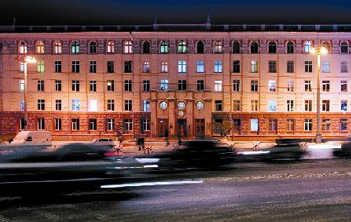Joint Declaration seals Eastern Partnership Event pact to boost ICT-based e-Infrastructures in Eastern Partnership Countries
12 February 2013 | Chisinau, Moldova
A joint declaration by 6 Eastern Partnership countries – Armenia, Azerbaijan, Belarus, Georgia, Moldova, Ukraine - was sent to the European Union on 11 February 2013, supporting ICT-based e-infrastructures for research and education in the Eastern Europe region. This is a follow-up of the Eastern Partnership Event that was held in Moldova from 11-12 December 2012.
Joint declaration
The declaration recognises the key importance of e-infrastructures for research and education, the vital role that national and international research and education networking organisations play in supporting their development, and an undertaking that national governments within the region should improve the competitiveness of the telecommunications environments in their countries in order to reduce barriers to the development of these e-infrastructures.
The declaration also recognises the important roles played by the GÉANT pan-European backbone infrastructure, the National Research and Education Networking organisations (NRENs), and European organisations such as DANTE, TERENA and EGI.eu in supporting the development of e-infrastructures, services and related expertise, and calls for NRENs to be supported to the level necessary to fully participate in European e-infrastructures activities.
The Joint Declaration was signed by 39 key stakeholders of e-infrastructures in these countries and was supported by 13 European e-infrastructure and research and education networking organisations. It was sent to High Representative of the European Union for Foreign Affairs and Security Policy, Vice-President of the European Commission, Catherine Ashton, to Commissioner for Enlargement and European Neighbourhood Policy Štefan Füle, and to Vice-President Neelie Kroes.
The Eastern Partnership Event
The Eastern Partnership Event sought to stimulate debate on how to improve e-infrastructures in Armenia, Azerbaijan, Belarus, Georgia, Moldova and Ukraine by providing an opportunity for stakeholders to meet with policy makers in order to raise awareness of the importance of computer networks and services. A follow-up feasibility study for the establishment of a regional network connecting all Eastern Partnership countries is being considered.
The event was organised by TERENA, as part of the GÉANT project’s Development Support Activity, and by the Academy of Sciences of Moldova under the auspices of the European Union’s Eastern Partnership Platform 4 'Contacts between People'. This regional cooperation programme was inaugurated in May 2009 to deepen and strengthen relations between the EU and its 6 Eastern neighbours. It provides support to initiatives contributing to the stability and security of partner countries, and that improve effective cooperation between those countries and the EU.
The report and Joint Declaration are available online via the Eastern Europe Partnership Event web pages of the TERENA website. About Academy of Sciences of Moldova
About Academy of Sciences of Moldova
The Academy of Sciences of Moldova (A.S.M.), in its role as the highest scientific forum of the country, represents the only public institution of national interest in the sphere of science and innovation, is a plenipotentiary coordinator of scientific and innovation activity, scientific consultant of the public authorities of the Republic of Moldova, has an autonomous statute and acts on the basis of self-administration principles.
The Academy of Sciences develops its activity according to the provisions of the Constitution of the Republic of Moldova, the Code on Science and Innovation, the Partnership Agreement with the Government of the country, its Statute and other legislative and normative documents. For more information, visit http://www.asm.md/
About GÉANT Development Support Activity
There is a significant digital divide in Europe. The networking services available to researchers, teachers and students in some countries are far below the level that is common in other parts of Europe. Similar gaps even exist within a single country. Narrowing this gap is of the utmost importance for achieving the European Union's political objective of equal opportunities for researchers throughout the European Research Area.
The task of assisting the development of research and education networking in less advanced countries is led by TERENA (Trans-European Research and Education Networking Association) as part of the GÉANT project. This task contributes to narrowing the divide in the development of research and education networking that exists between the countries in and close to Europe that will be connected, directly or indirectly, to the pan-European GÉANT network.
About TERENA
The Trans-European Research and Education Networking Association, TERENA, is the association brings together Europe’s research networking organisations, research institutes, equipment vendors and telecommunications operators to exchange information and experience, and to collaborate on a range of activities including task forces, projects, events and services. For more information about TERENA, visit www.terena.org.

